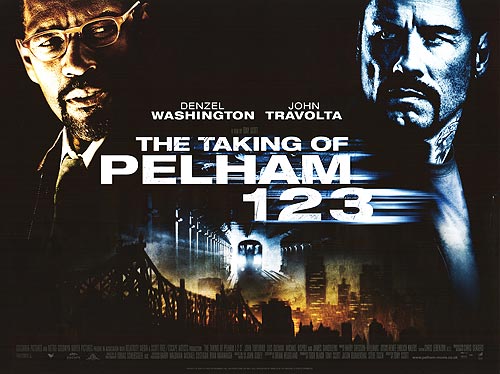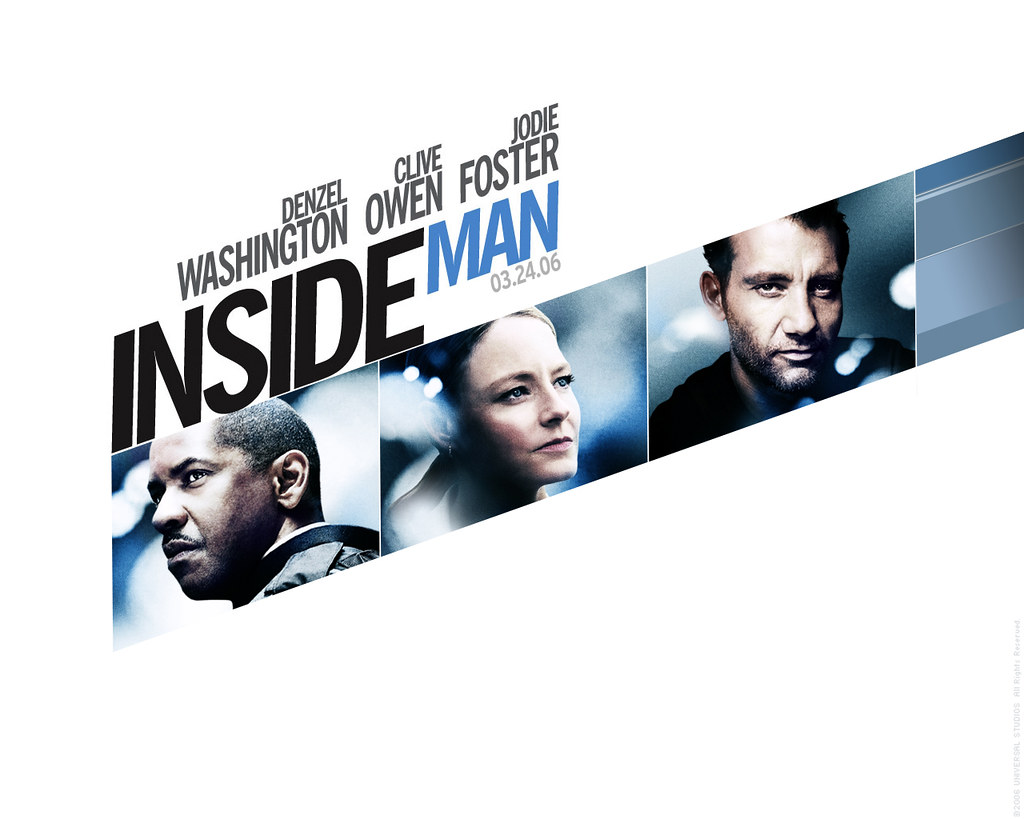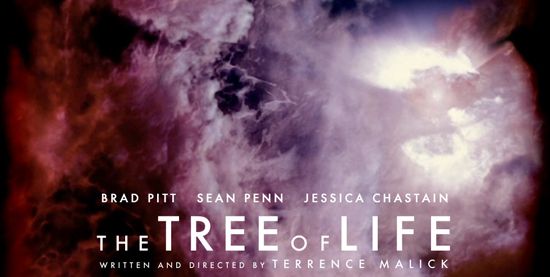The Taking of Inside Man
Howdy, long time no ramble, but I've just watched Tony Scott's update of The Taking of Pelham 123 (2009) and found it impossible to resist the urge to post...well...a post on the differences between this film and Inside Man (Spike Lee, 2006). I must have a reason for saying this - it's only right. You can't just go around arbitrarily comparing stuff: "Do you know why apples are better than magnesium?" or "Penguins are better swimmers than walnuts." That kinda thing just doesn't wash and is not the type of chatter I wish to engage in here - you're busy, I'm busy...y'know.
The Taking of Pelham 123 is based on a novel by John Godey and will obviously pay more than a passing glance to the 1974, Joseph Sargent film of the same name and source material, but (and here is the point at last) I think the text it takes the most inspiration from (or perhaps tries to emulate) is Spike Lee's 2006 heist thriller Inside Man, and it is this supposition that has driven me to this. So if that sounds like something you could give up 10 minutes or so of your life for then please read on, if not, I'm sorry but this is how I trundle.
The plot of the two films mirror each other. Two audacious criminals (played in The Taking of Pelham 123 by John Travolta and Clive Owen in Inside Man) stage two very daring crimes. Both criminals are persued by Denzel Washingon, whose character in both films is under investigation for alleged financial irregularities. At each film's opening Denzel's job position is dictated by the crime he is alleged to have committed and the main conflict of each film offers his characters a chance to get back on top.
Hang on, I imagine hearing you impatiently scream at your computer, I thought this was about the differences between the two films!? Well, you're absolutely right and so to the main drive behind this idea, how the thematic and technical aspects of each film makes or breaks it. Leigh Singer suggested that one of the strengths of Inside Man comes from Spike Lee largely 'leaving his African-American concerns behind' (2006) but I think the opposite may be true, as it is perhaps Spike Lee's ubiquitous racial concerns that elevate this thriller above the norm - and it is this thematic approach that Tony Scott arguably tries to replicate and unfortunately perhaps where he mostly comes unstuck. He does give passing reference to terrorism and the fear of ethnicity that may have sprung since 9/11 but it feels like nothing more than window dressing behind the glass of a big shop full of explosions and chasing and shooting. He is up against Spike Lee who has made his career examining racism and bias and here he has a chance to bring it to the multiplexes, an intertextual nod even resurrects Sal's Famous Pizzeria from the ashes of his seminal, break through piece Do the Right Thing (1989) and arguably aligns the two films thematically.
The opening credit sequences of both films bare a few similarities - I know, the differences I'm getting there. Watch. Both films open by taking us out into the New York streets, juxtaposed with the gangs movement towards their targets, and the everyday of that target. Spike Lee, however, manages to push the multi-cultural and post-9/11 setting through music and a collage of images that seems to see the film frantically search the New York streets for a solid visual reference, a strong anchorage that the twin towers had always provided. Tony Scott's opening feels more like a music video, and that music (99 Problems) seems urban, everyday and counter to any sense you might try to make of the film: "I got 99 problems but a bitch ain't one" (apologies for the language but hey it's that foul-mouthed bugger Jay-Z's fault, I'm just trying to make a point) the bitter, potentially offensive, overtly masculine opening track makes the whole thing seem standard and underwhelming. Lee's choice of Chiyya Chiyya feels fresh and draws attention to itself, it has you asking questions right from the word go.
The rest of The Taking of Pelham 123 maintains the music video vibe (I'm not sure vibe is a word that I call pull off but I'll keep going) as Tony Scott keeps the shot length short and the cutting frequent, swirling and sweeping the camera as if he is impatient with cramped space of the film's setting and this arguably works counter to calm, composed and in control criminal that has created and maintains the situation. He gets his way and he seems to know exactly how these things work, but his urgency means he seems to keep reeling things back and has his hand forced at times. Scott doesn't pause for breath let alone contemplation, while Lee's more static approach means that the passage of time is felt and the cramped, immediate situation makes you feel like Owen's 'bad guy' is always in control. Travolta and Owen's criminals show a difference in approach too that may be telling. "This is the man that's going to rock this city!" "Do you see what I've done?" Travolta's master criminal brags, making himself and his purpose known right from the start, while Clive Owen's character hides behind accents and uniforms. Inviting constant questions and speculation. His opening monologue itself is based on series of questions and it is the questions that he, and Lee, are interested in - not the smartarse, audacious nature of the crime.
In The Taking of Pelham 123, as hostage negotiator John Turturro and Denzel Washington fly above the city on route with the money, Turturro points out that "It's nice seeing it from this perspective huh? Let's you see what you're fighting for." Despite this sequence we never really get a sense of the city or what is necessarily worth fighting for. Inside Man on the other hand revels in the people of New York and their diversity, we hear their stories and see their character, and the film arguably represents a collective strength that Tony Scott's film never comes close to, or perhaps even understands. Scott's film ends on the assurance that Denzel's individual act of heroism will be rewarded, the mayor assures him that "On Monday the City of New York will go to bat for you" and while the city is grateful they didn't pull together, and the men at the top still hold all the cards and call the shots on behalf of everyone else. Lee's film is resolved by a team effort, or at least an interrogation of who the victims really are, and an extra push to find the 'real' criminals. Inside Man demonises those at the very top of our the economic institutions and shows how capitalism without humanism can be monstrous, and abuses of the past cannot be simply excised by being a bit better in the future. Tony Scott portrays the economic systems and stock markets as tools that have the potential to be exploited by evil individuals but are not inherently abusive in themselves. His world is simple, there are good guys and there are bad guys, sometimes the good guys do bad things but they are caught and accept their punishment - society works. Lee presents the complexities of human nature, the complexities of what is deemed good or bad, the shades of grey - society works for some and offers them protection regardless of their nature and past deeds...unless someone is willing to shake the cage. Washington's different characters and situation may again point to the this. One man guilty of abusing the system for his personal gain and paying a price for it, until he is given the chance to redeem himself. The other wrongly accused and persecuted by the system, who continues to work, and work hard, for the good of society at large. Not just follow orders. I'll let you decide which characterisation goes with which film.
This comparison represents for me why film is important and how I can try to legitimise my continual chatter about it. Give two people very similar subject matter and the same tools and watch as an artisan creates something special and a technician creates nothing new. I'm sleepy now, J
 |
| Source: www.reelreview.co.uk/?p=542 |
The plot of the two films mirror each other. Two audacious criminals (played in The Taking of Pelham 123 by John Travolta and Clive Owen in Inside Man) stage two very daring crimes. Both criminals are persued by Denzel Washingon, whose character in both films is under investigation for alleged financial irregularities. At each film's opening Denzel's job position is dictated by the crime he is alleged to have committed and the main conflict of each film offers his characters a chance to get back on top.
Hang on, I imagine hearing you impatiently scream at your computer, I thought this was about the differences between the two films!? Well, you're absolutely right and so to the main drive behind this idea, how the thematic and technical aspects of each film makes or breaks it. Leigh Singer suggested that one of the strengths of Inside Man comes from Spike Lee largely 'leaving his African-American concerns behind' (2006) but I think the opposite may be true, as it is perhaps Spike Lee's ubiquitous racial concerns that elevate this thriller above the norm - and it is this thematic approach that Tony Scott arguably tries to replicate and unfortunately perhaps where he mostly comes unstuck. He does give passing reference to terrorism and the fear of ethnicity that may have sprung since 9/11 but it feels like nothing more than window dressing behind the glass of a big shop full of explosions and chasing and shooting. He is up against Spike Lee who has made his career examining racism and bias and here he has a chance to bring it to the multiplexes, an intertextual nod even resurrects Sal's Famous Pizzeria from the ashes of his seminal, break through piece Do the Right Thing (1989) and arguably aligns the two films thematically.
The opening credit sequences of both films bare a few similarities - I know, the differences I'm getting there. Watch. Both films open by taking us out into the New York streets, juxtaposed with the gangs movement towards their targets, and the everyday of that target. Spike Lee, however, manages to push the multi-cultural and post-9/11 setting through music and a collage of images that seems to see the film frantically search the New York streets for a solid visual reference, a strong anchorage that the twin towers had always provided. Tony Scott's opening feels more like a music video, and that music (99 Problems) seems urban, everyday and counter to any sense you might try to make of the film: "I got 99 problems but a bitch ain't one" (apologies for the language but hey it's that foul-mouthed bugger Jay-Z's fault, I'm just trying to make a point) the bitter, potentially offensive, overtly masculine opening track makes the whole thing seem standard and underwhelming. Lee's choice of Chiyya Chiyya feels fresh and draws attention to itself, it has you asking questions right from the word go.
 |
| Source: www.moviewallpaper.net/w/Denzel_Washington_in_Inside_Man_Wallpaper_1_1280.html |
The rest of The Taking of Pelham 123 maintains the music video vibe (I'm not sure vibe is a word that I call pull off but I'll keep going) as Tony Scott keeps the shot length short and the cutting frequent, swirling and sweeping the camera as if he is impatient with cramped space of the film's setting and this arguably works counter to calm, composed and in control criminal that has created and maintains the situation. He gets his way and he seems to know exactly how these things work, but his urgency means he seems to keep reeling things back and has his hand forced at times. Scott doesn't pause for breath let alone contemplation, while Lee's more static approach means that the passage of time is felt and the cramped, immediate situation makes you feel like Owen's 'bad guy' is always in control. Travolta and Owen's criminals show a difference in approach too that may be telling. "This is the man that's going to rock this city!" "Do you see what I've done?" Travolta's master criminal brags, making himself and his purpose known right from the start, while Clive Owen's character hides behind accents and uniforms. Inviting constant questions and speculation. His opening monologue itself is based on series of questions and it is the questions that he, and Lee, are interested in - not the smartarse, audacious nature of the crime.
In The Taking of Pelham 123, as hostage negotiator John Turturro and Denzel Washington fly above the city on route with the money, Turturro points out that "It's nice seeing it from this perspective huh? Let's you see what you're fighting for." Despite this sequence we never really get a sense of the city or what is necessarily worth fighting for. Inside Man on the other hand revels in the people of New York and their diversity, we hear their stories and see their character, and the film arguably represents a collective strength that Tony Scott's film never comes close to, or perhaps even understands. Scott's film ends on the assurance that Denzel's individual act of heroism will be rewarded, the mayor assures him that "On Monday the City of New York will go to bat for you" and while the city is grateful they didn't pull together, and the men at the top still hold all the cards and call the shots on behalf of everyone else. Lee's film is resolved by a team effort, or at least an interrogation of who the victims really are, and an extra push to find the 'real' criminals. Inside Man demonises those at the very top of our the economic institutions and shows how capitalism without humanism can be monstrous, and abuses of the past cannot be simply excised by being a bit better in the future. Tony Scott portrays the economic systems and stock markets as tools that have the potential to be exploited by evil individuals but are not inherently abusive in themselves. His world is simple, there are good guys and there are bad guys, sometimes the good guys do bad things but they are caught and accept their punishment - society works. Lee presents the complexities of human nature, the complexities of what is deemed good or bad, the shades of grey - society works for some and offers them protection regardless of their nature and past deeds...unless someone is willing to shake the cage. Washington's different characters and situation may again point to the this. One man guilty of abusing the system for his personal gain and paying a price for it, until he is given the chance to redeem himself. The other wrongly accused and persecuted by the system, who continues to work, and work hard, for the good of society at large. Not just follow orders. I'll let you decide which characterisation goes with which film.
This comparison represents for me why film is important and how I can try to legitimise my continual chatter about it. Give two people very similar subject matter and the same tools and watch as an artisan creates something special and a technician creates nothing new. I'm sleepy now, J



Interesting choices for comparison. I had never heard many good things about 'The Taking of Pelham' so I hadn't bothered with it but I may give it a try now baring in mind these comparisons. I remember watching 'Inside Man' in your class, I seriously loved that film and I forgot it was Spike Lee who directed it. It just never struck me as his type of film, which is obviously great since it worked so well.
ReplyDelete